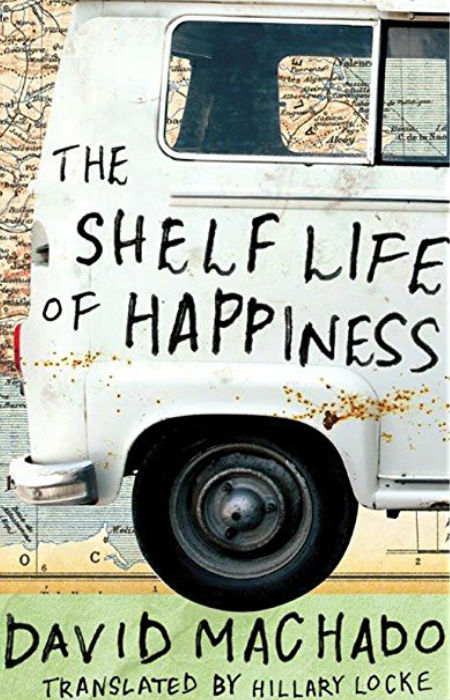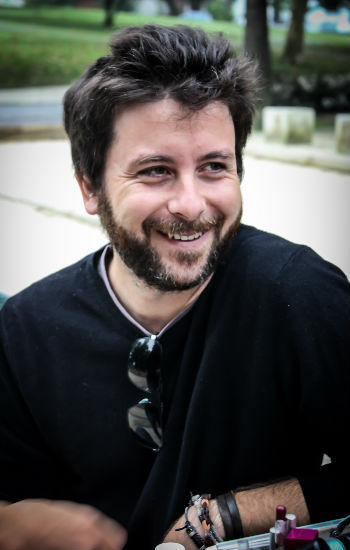
What makes you happy?
Kind of stumped for an answer? Don’t worry. it’s a question that leaves a lot of people flat-footed, including the first-person protagonist of David Machado’s illuminating novel The Shelf Life of Happiness which beautifully and blisteringly honestly examines what makes us happy.
Or given this is set in Portugal during the 2008 Global Financial Crisis, what takes away from happiness, assuming, as Daniel often does, that you were even happy in the first place.
The challenging thing about this most lauded and quested-after emotional states is that it’s ridiculously intangible, a case of “we’ll know it, when we see it” (but really do we?). that just as it appears to be in our grasp, suddenly vanishes into thin existential air.
That’s certainly what Daniel discovers as his life, once seemingly blissfully content with a job as a designer of tours throughout Europe and the world, a marriage to soul mate Marta and kids Flor and Mateus, and close friendships (although a little worse for wear) with imprisoned Almodóvar and reclusive Xavier, begins to unravel one messy life event after another.
As the world slides deeper into financial hardship and distress, taking Portugal right along with it, making life precarious for many of its citizens who found their cast-iron assumptions about life and its certainties, such as they imagined them, ruthlessly challenged at every turn.
“It was this lack of future that scared me most. How can someone not think about the future? Thoughts of tomorrow, or next month, or the next ten years—how do they not weigh on someone? How can a person wake up every morning and not feel any hopes or fears about what might happen? I didn’t know how to relate to someone like that.” (P. 7)
Daniel was and is one of those people, a man who had a Plan, all neatly written out and encased in a folder, that allowed for pretty everything to happen to him in life, yes, even the setbacks, but who found that the great crises of life have no sentiment for the best-laid plans of mice and men.
In fact, as the company he works for folds, suddenly and calamitously, and his wife and kids move hours away to live in her parents’ hometown of Viana, Daniel finds all the linchpins of his life being unceremoniously pulled out one by one.
It would be tempting, as he discovers Almodóvar’s teenage son Vasco is running with a drug-running gang who films their cruel attacks on homeless people, such as Daniel’s now homeless gay seventh-grade maths teacher, Alvo, and finds his car set on fire, the car in which he is sleeping after his house is repossessed, to believe that all is lost.
But Daniel, who like many of the people in his life has every reason to give up, refuses to do so, adamant that he will weather the storm come what may, a tenacious belief that survives a whole series of events including a trip to Switzerland to help an old woman visit her dying brother in hospital, a selfless act generated by a failing social media site he and his friends launched that proves how tenuous and unpredictable happiness can be.

What he neglects in all this self-belief about the ability of life to deliver on self-imagined promises is that he needs Hilary Clinton’s oft-talked about village to make it happen.
As he drifts further from contact with Marta and the kids, although the link is never severed and endures despite everything, and continues to lash out at Xavier, who refuses to surrender his reclusive lifestyle, and rail at Almodóvar’s unwillingness to accept visitors in prison, he loses sight of that fact that much of our happiness, such as it is, comes from our connectivity to others.
Obstinately pushing on is admirable, but there is only so long that you can do this on your own and not lose much of what made you that person in the first place, formative influences surrendered that, for better or worse, come from the significant people in our lives.
Daniel misses this salient fact for much of the book but despite his anger and his grinding and often lamenting sense of betrayal, Machado invests the book’s protagonist and the source of the book’s heart and soul, with an authentic humanity that can’t fail to affect you.
Sure Daniel is angry, irritable and lost and can’t seem to summon the good sense to do the most things that would help him get out of the mess his life becomes, or at least make it more bearable, but he is absolutely every one of us, with none of us really able to see our way out of the maze of our creation.
Others can see it but we often can’t, blinded by long-held assumptions, blinkered perception, and even, ironically, like Daniel himself, by the hope that things will get better.
“… she was happy with the life she had left. Even without her husband, even without her legs, even without the world around her. Old people usually complain that their hours feel too long. But she didn’t feel that way. There was no revolt or anguish in her voice when she spoke of her life, no trembling in her eyes when she thought of the past. I had imagined she was a defeated woman, but it was a gross error of judgement. I didn’t even need to calculate her happiness index. She was there in front of me, and her happiness was evident.” (P. 192)
Machado beautifully captures the sharp and at time willful contrariness of our humanity, sympathetically portraying Daniel not as a figure worthy of judgement and opprobrium, though you will fall victim to that despite your best intentions, but as a man, a fallible man, who simply wants things to work as he imagined they would.
He doesn’t demand or expect happiness, and certainly when Xavier first speaks about his Happiness Index – each chapter is headed by the happiness ratings of every country on Earth; the idea being if you want to be happier, you move to a place with a higher rating than your own – Daniel dismisses it as self-indulgent silliness that has no real place in the harsh vagaries of life.
But as he grapples with the seismic shifts in his life, which Machado presents not as melodramatic, narrative-fuelling events but simply things that befall Daniel in the ordinary course of events, he comes to appreciate that happiness might be intangible and elusive but appreciating the good things in your life, the ones that are there in the here and now, is every real and as true as anything else in the physical world.
It’s hardly a road to Damascus moment and Machado takes care not to superficially play it as such (although seemingly insignificant incident at the end of the book does have a major effect on Daniel’s view of the world) but it’s enough of a revelation, gleaned on the road trip to Switzerland with his kids, Xavier, Vasco and driver of the van Alípio, that it reorients his view of life, and sets him, you have to imagine on an entirely new course.
It’s not enough to fix everything – Machado is wise enough to know life is rarely that generous or cleanly decisive – but it’a decisive break with his self-mired past, and while it may not lead to happiness, it can only make life, whatever form it takes, Plan or no Plan, that much better.